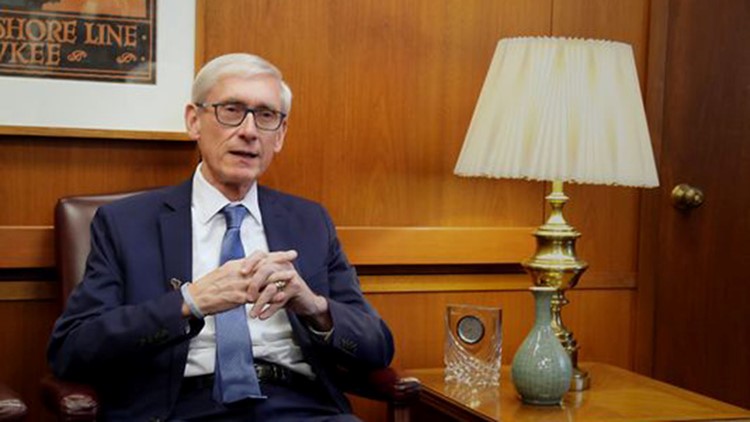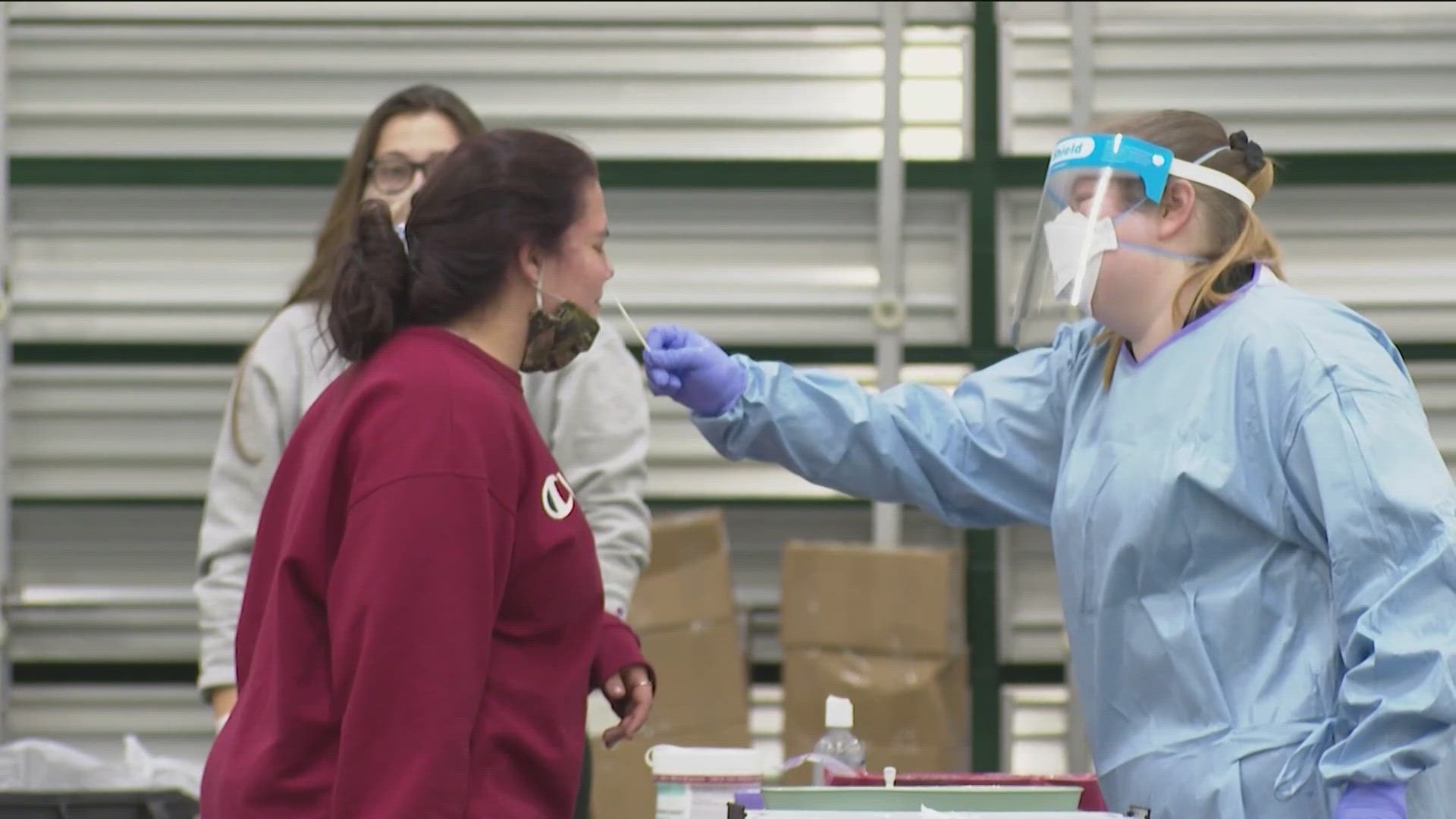MADISON, Wis. — The Wisconsin Supreme Court struck down Gov. Tony Evers' coronavirus stay-at-home order Wednesday, ruling that his administration overstepped its authority when it extended it for another month without consulting legislators.
The 4-3 ruling essentially reopens the state, lifting caps on the size of gatherings, allowing people to travel as they please and allowing shuttered businesses to reopen, including bars and restaurants. The Tavern League of Wisconsin swiftly posted the news on its website, telling members, "You can OPEN IMMEDIATELY!"
Some bars did just that. Nick’s Bar in Platteville, in far southwest Wisconsin, posted a 30-second video late Wednesday that showed the bar teeming with people drinking, talking and bobbing their heads to music. Bars in Appleton and Kaukauna in northeast Wisconsin also opened and were packed with people.
The party may be short-lived in Appleton. City officials signed an order Wednesday that took effect at 8 a.m. Thursday continuing the state’s “safer at home” order. Other communities were taking similar steps, including Racine, Kenosha County and Brown County, home to Green Bay.
In Dane County, home to the capital of Madison, officials quickly imposed a mandate incorporating most of the statewide order until May 26. Milwaukee health officials said a stay-at-home order they enacted in late March remains in effect and does not have an end date.
"We are the Wild West," Evers told MSNBC in the wake of the court's decision, as scenes of people filling just-opened bars flooded social media and the broadcast airwaves. "“There are no restrictions at all across the state of Wisconsin. … So at this point in time … there is nothing compelling people to do anything other than having chaos here.”
The decision let stand language that had closed schools, however, and local governments can still impose their own health restrictions. In Dane County, home to the capital of Madison, officials quickly imposed a mandate incorporating most of the statewide order. City health officials in Milwaukee said a stay-at-home order they enacted in late March remains in effect.
Evers reacted angrily in a conference call Wednesday night, saying the state has been doing well in the fight against the coronavirus. He predicted the court ruling will lead more counties to adopt their own restrictions, leading to a confusing patchwork of ordinances that will allow infection to spread.
"Today, Republican legislators convinced four members of the state Supreme Court to throw the state into chaos," Evers said. "They have provided no plan. There's no question among anybody that people are going to get sick. Republicans own that chaos."
On Thursday Evers sounded a bit more calm but still regretful while making a radio address about the ruling.
Hi, folks. Governor Tony Evers here.
As you may have heard, the State Supreme Court struck down Wisconsin’s Safer at Home order, effective immediately.
Until now, Wisconsin was in a pretty good place in our battle against COVID-19.
We had reached almost all our gating criteria, we had opened up small businesses across the state, putting folks back to work, and that was because of the good work of Wisconsinites across our state who banded together, stayed home, and stayed safe.
Now just because the Supreme Court says it’s okay to open, doesn’t mean the science does. Folks, deadly viruses don’t go away on their own and they don’t go away because the Supreme Court says so.
We cannot let this ruling undo all the work we have done and all the sacrifices Wisconsinites have made over these past few months.
We need everyone to continue doing their part to keep our families, our neighbors, our healthcare providers, as well as our communities safe by continuing to stay safer at home, practice social distancing, and limit travel.
I am disappointed in the Court’s decision, but our top priority has been and will remain doing what we can and what we have to do to protect the health and safety of the people of our state.
I hope you will join us in continuing to stay safe and stay home.
The court ruling drew praise Thursday from President Donald Trump, who called it a “win” in a post on Twitter and added: “Its Democrat Governor was forced by the courts to let the State Open. The people want to get on with their lives. The place is bustling!”
In Wednesday's decision Chief Justice Patience Roggensack wrote for the majority that health secretary Andrea Palm's order amounted to an emergency rule that she doesn't have the power to create on her own.
"Rule-making exists precisely to ensure that kind of controlling, subjective judgement asserted by one unelected official, Palm, is not imposed in Wisconsin," Roggensack, part of the court's 5-2 conservative majority, wrote.
Rebecca Dallet, one of the court's liberal justices, dissented, saying the decision will "undoubtedly go down as one of the most blatant examples of judicial activism in this court's history. And it will be Wisconsinites who pay the price."
Dallet also took aim at the potential delay of a rule-making process: "A review of the tedious multi-step process required to enact an emergency rule illustrates why the Legislature authorized DHS to issue statewide orders to control contagion."
State Assembly Speaker Robin Vos and Senate Majority Leader Scott Fitzgerald, both Republicans, said they're confident businesses can safely reopen by following guidelines calling for letting workers stay home if they're sick, making workers wash their hands and implementing telework and social distancing and postponing travel and events.
"This (court decision) does not promote people to act in a way that they believe endangers their health," they said.
Evers first issued a stay-at-home order in March that closed schools and nonessential businesses. The order was supposed to lift April 24, but Palm, an Evers appointee, extended it to May 26.
Republicans asked the Supreme Court to block the extension, arguing that Palm exceeded her authority because the extension amounted to an administrative rule that required legislative approval. Evers countered that state law clearly gives the executive branch broad authority to quickly enact emergency measures to control communicable diseases.
Nearly seven of 10 Wisconsin residents back Evers' "safer at home" order, based on a Marquette University Law School poll released Tuesday, though that support was down from 86% in March.
Evers' administration faced an uphill battle in convincing the conservative court to keep the order in place. Three of the conservatives joined Roggensack; the remaining conservative, Brian Hagedorn, joined Dallet and fellow liberal justice Ann Walsh Bradley in dissent.
The Republican legislators had asked the court to let the rule remain in place for six days to give them time to work with Evers' administration on an alternative plan. The court refused to grant the stay, saying the two sides have had weeks to come up with something.
The GOP so far has not offered any alternative plans. The state's chamber of commerce has suggested allowing all businesses to open at once while compelling higher-risk establishments and operations to take increasingly strict mitigation measures such as requiring employees to use protective gear.
Evers said there's no avenue to appeal the decision. His administration plans to put together an emergency rule addressing the virus, he said, but the process is so complex that it could be at least two weeks before state health officials can start drafting it. And the final product could be blocked by legislators.
"In the meantime, we're going to have 72 counties doing their own thing," Evers said. "I can't believe there's a state in the nation with this type of chaos."
Vos and Fitzgerald said in their statement that they want to work with the administration on rules that would provide clear guidance in case COVID-19 "reoccurs in a more aggressive way."
The GOP move against Evers mirrors actions taken by Republican-controlled legislatures in other states, most notably against the Democratic governors in nearby "blue wall" states Michigan and Pennsylvania. All three are critical presidential battlegrounds in November.
The GOP has been working to weaken Evers' powers since he ousted incumbent Republican Gov. Scott Walker in 2018.
During Walker's final weeks in office, Republicans adopted a set of laws that prohibited Evers from ordering the attorney general to withdraw from lawsuits, a move designed to prevent the governor from pulling Wisconsin out of a multistate lawsuit challenging the Affordable Care Act. The state Supreme Court has upheld those laws.
The high court also backed Republicans over Evers in the GOP's insistence on holding in-person voting for April's presidential primary despite the health risks of the coronavirus.



